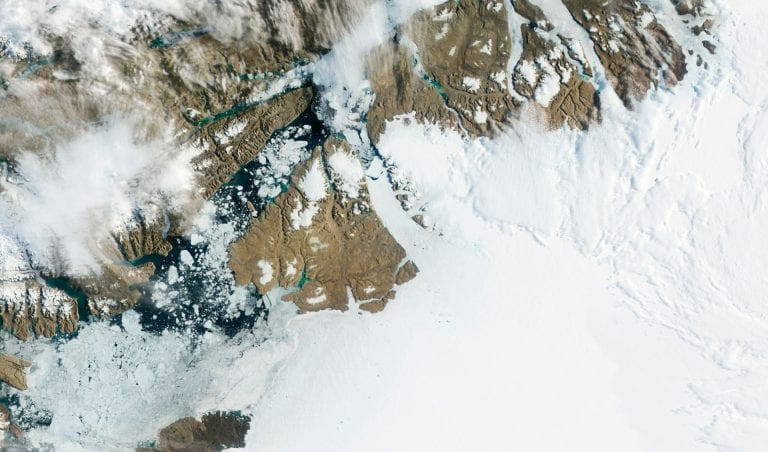UC Irvine, NASA JPL researchers discover a cause of rapid ice melting in Greenland

In the center of this NASA photograph taken in 2012, Petermann Glacier in northwest Greenland gradually moves toward the ocean, with large segments breaking off and drifting away as icebergs. Researchers at UCI and NASA JPL used satellite data from three European missions to learn how warm ocean water is causing the migration of the glacier’s grounding line, leading to its rapid deterioration.
Irvine, Calif., May 8, 2023 – While conducting a study of Petermann Glacier in northwest Greenland, researchers at the University of California, Irvine and NASA’s Jet Propulsion Laboratory uncovered a previously unseen way in which the ice and ocean interact. The glaciologists said their findings could mean that the climate community has been vastly underestimating the magnitude of future sea level rise caused by polar ice deterioration.
Using satellite radar data from three European missions, the UCI/NASA team learned that Petermann Glacier’s grounding line – where ice detaches from the land bed and begins floating in the ocean – shifts substantially during tidal cycles, allowing warm seawater to intrude and melt ice at an accelerated rate. The group’s results are the subject of a paper published in Proceedings of the National Academy of Sciences.
“Petermann’s grounding line could be more accurately described as a grounding zone, because it migrates between 2 and 6 kilometers as tides come in and out,” said lead author Enrico Ciraci, UCI assistant specialist in Earth system science and NASA postdoctoral fellow. “This is an order of magnitude larger than expected for grounding lines on a rigid bed.”
He said the traditional view of grounding lines beneath ocean-reaching glaciers was that they did not migrate during tidal cycles, nor did they experience ice melt. But the new study replaces that thinking with knowledge that warm ocean water intrudes beneath the ice through preexisting subglacial channels, with the highest melt rates occurring at the grounding zone.
The researchers found that as Petermann Glacier’s grounding line retreated nearly 4 kilometers – 2½ miles – between 2016 and 2022, warm water carved a 670-foot-tall cavity in the underside of the glacier, and that abscess remained there for all of 2022.
“These ice-ocean interactions make the glaciers more sensitive to ocean warming,” said senior co-author Eric Rignot, UCI professor of Earth system science and NASA JPL research scientist. “These dynamics are not included in models, and if we were to include them, it would increase projections of sea level rise by up to 200 percent – not just for Petermann but for all glaciers ending in the ocean, which is most of northern Greenland and all of Antarctica.”
The Greenland ice sheet has lost billions of tons of ice to the ocean in the past few decades, the PNAS paper stresses, with most of the loss caused by warming of subsurface ocean waters, a product of Earth’s changing climate. Exposure to ocean water melts the ice vigorously at the glacier front and erodes resistance to the movement of glaciers over the ground, causing the ice to slide more quickly to the sea, according to Rignot.
Ciraci’s research was supported by the NASA Postdoctoral Program at the Jet Propulsion Laboratory. Joining Ciraci and Rignot on the project were Bernd Scheuchl, UCI associate project scientist; Valentyn Tolpekin and Michael Wollersheim of Finland’s Iceye mission; Lu An of China’s Tongji University; Pietro Milillo of the University of Houston; Jose-Luis Bueso-Bello of the German Aerospace Center; and Luigi Dini of the Italian Space Agency.
About UCI’s Brilliant Future campaign: Publicly launched on Oct. 4, 2019, the Brilliant Future campaign aims to raise awareness and support for UCI. By engaging 75,000 alumni and garnering $2 billion in philanthropic investment, UCI seeks to reach new heights of excellence in student success, health and wellness, research and more. The School of Physical Sciences plays a vital role in the success of the campaign. Learn more by visiting https://brilliantfuture.uci.edu/uci-school-of-physical-sciences.
About the University of California, Irvine: Founded in 1965, UCI is a member of the prestigious Association of American Universities and is ranked among the nation’s top 10 public universities by U.S. News & World Report. The campus has produced five Nobel laureates and is known for its academic achievement, premier research, innovation and anteater mascot. Led by Chancellor Howard Gillman, UCI has more than 36,000 students and offers 224 degree programs. It’s located in one of the world’s safest and most economically vibrant communities and is Orange County’s second-largest employer, contributing $7 billion annually to the local economy and $8 billion statewide. For more on UCI, visit www.uci.edu.
Media access: Radio programs/stations may, for a fee, use an on-campus ISDN line to interview UCI faculty and experts, subject to availability and university approval. For more UCI news, visit news.uci.edu. Additional resources for journalists may be found at communications.uci.edu/for-journalists.
